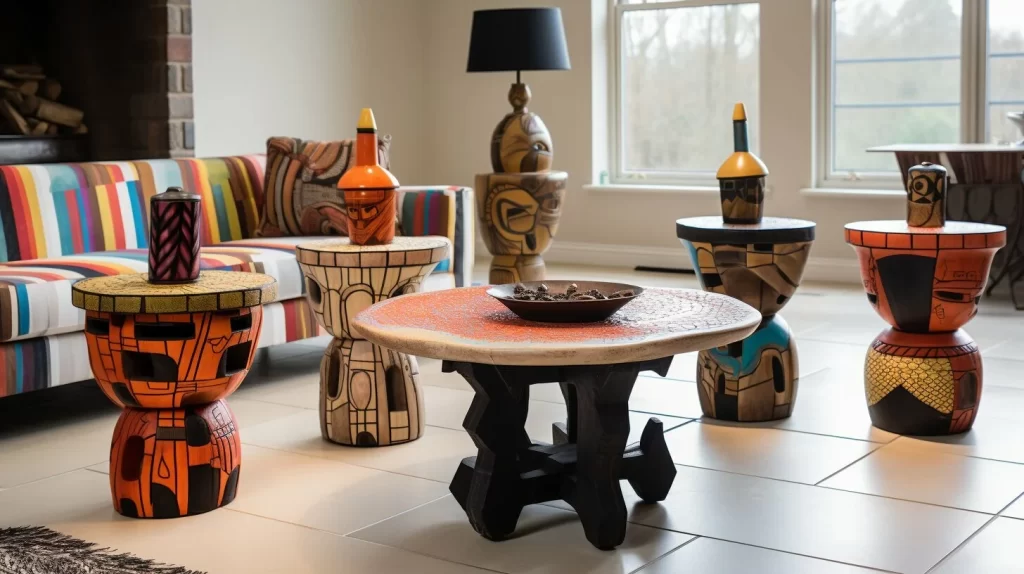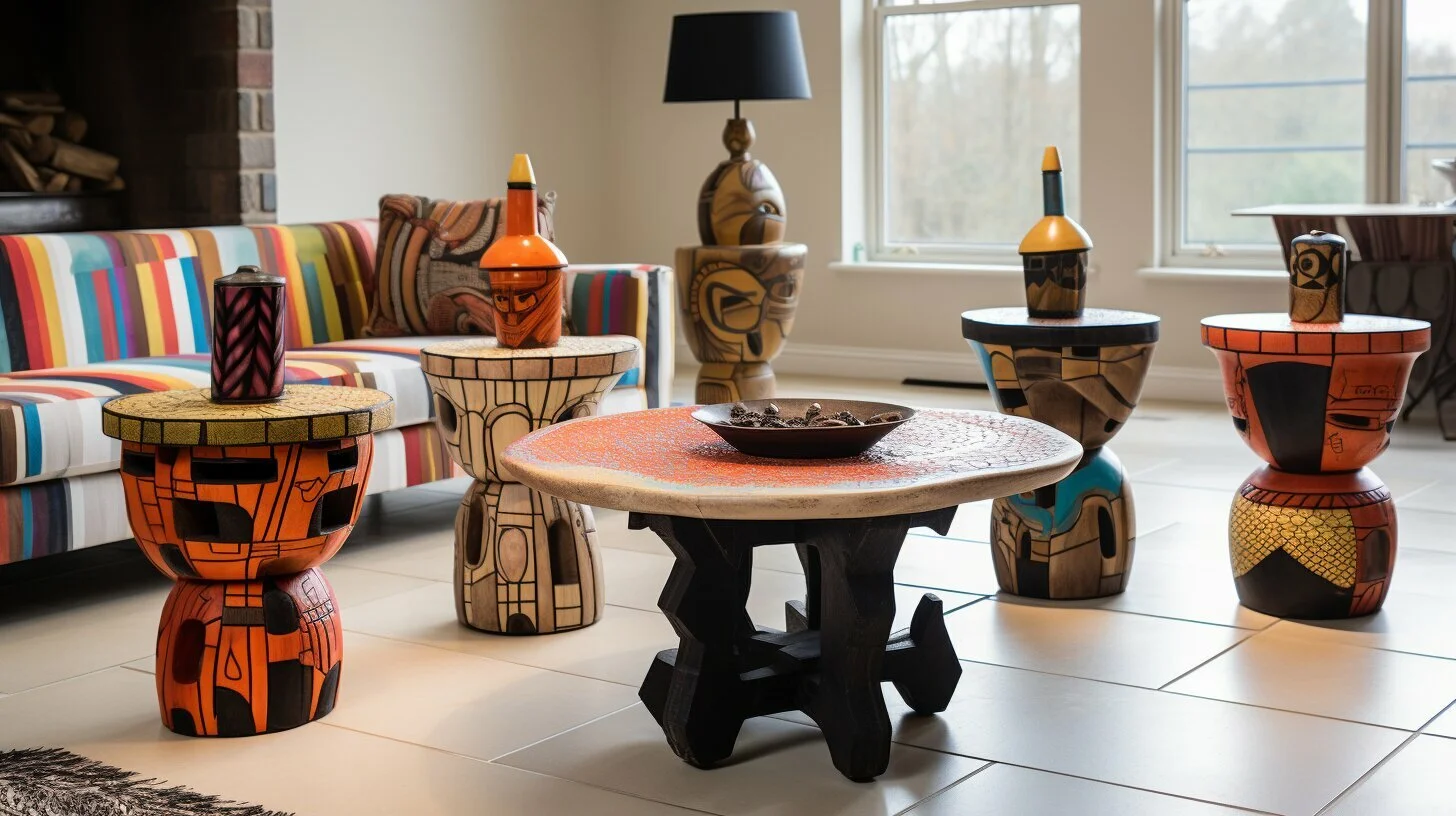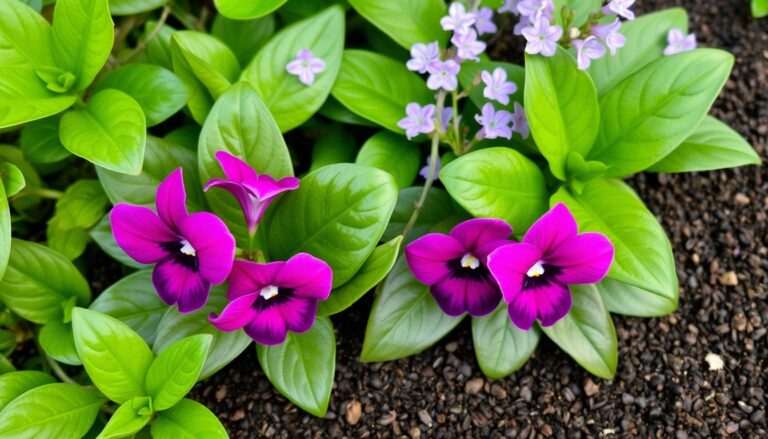What Is an African Coffee Table?
When I consider furniture that brings personality and coziness to a living area, I recall the African coffee table. These tables are not only useful items; they represent deep cultural narratives and skilled workmanship.
They come from diverse areas throughout Africa, with each table narrating its unique story via its design and build-up.
The coffee tables from Africa frequently are made by hand, with methods known for many years and shared among generations. This artistry makes every table special, showing the personal touch of its creator.
The materials used could be wood, metal, or even stones. These tables have a function but they also become important pieces of art in your home.
The Unique Styles of African Coffee Tables

Coffee tables from Africa are found in many designs, showing the diverse cultures of this continent. There are complex carvings made by Akan people in Ghana or bright colors seen in Moroccan styles, and there is a design to match all preferences.
You may see tables displaying customary tribal designs, frequently influenced by local traditions and storytelling. The patterns vary from uncomplicated geometric figures to elaborate motifs symbolizing animals or the environment.
On the other hand, modern African coffee tables may combine traditional skills with current style preferences, adopting neat lines and minimalist patterns to attract more people.
Materials and Craftsmanship
One of the notable features of African coffee tables is their making. Many craftspeople use materials found in local areas, guaranteeing every item to be not only attractive but also eco-friendly.
Wood is a preferred option, often choosing types such as mahogany, teak, and ebony for their strong properties and natural attractiveness. The design in the grain of these woods can’t be very beautiful, displaying the unique craft of nature itself.
Some tables incorporate metalwork that exhibits the abilities of African metal craftspeople who create amazing complex patterns with wrought iron or brass.
Others might feature woven elements, practical use, and artistic creation. Often, these kinds of tables can pair well with woven baskets or fabrics, providing more depth to your room decoration through different textures.
In addition to wood and metal, some coffee tables may also incorporate stone. For instance, tables made from soapstone or .granite can bring a country-style, natural touch to your living room.
They provide a difference in comparison to the cozy feel of wooden items. This mixture of materials gives countless opportunities for discovering a table that matches your taste.
How to Choose the Right African Coffee Table
Selecting the right African coffee table for your house can feel thrilling but also daunting. Here few suggestions to think about:
- Size Matters:
Check the size of your room to confirm that the table will fit nicely in your living space. A big table can function as a main attraction, but a smaller one might match other pieces of furniture better.
For those who have lots of space, putting a large coffee table has the potential to make it feel more welcoming and promote socializing and discussion.
- Style Compatibility:
Think about your present decoration. Is it contemporary or classic in style? Selecting a table that matches your design taste will make the overall appearance harmonious.
For instance, if your house has a bohemian feel, you may choose a table that has bright colors and detailed carvings.
- Functionality:
Consider how you plan to utilize the table. Is it going to function as a coffee table, a place for showcasing decoration pieces, or maybe even both? Your decision on this matter will guide your selection in terms of size and design.
If you frequently have guests, perhaps a bigger table with sufficient space for beverages and snacks may be what you need.
- Authenticity:
Search for tables that show real African handwork. When you help local crafters, it doesn’t only make your house better but also helps to keep traditional arts alive. Every item has a story and cultural importance which gives more value to what you buy.
- Budget:
It is important to put money into quality but keep in mind your budget. Prices can greatly vary for African coffee tables, hence deciding how much you are ready to pay becomes crucial.
Do not forget that buying a well-made item can increase the worth of your house over time.
Integrating an African Coffee Table into Your Décor
After selecting the ideal African coffee table, your next job is to make it blend well with your living room. Here are a few suggestions to help you increase its prominence:
- Accessorize:
Utilize bright fabrics, for instance, multicolored tablecloths, coasters, or ornamental bowls to support the design of the table. These adornments can contribute character and communicate your preference.
- Layering:
Make the view attractive by using varying surfaces. Match the table with woven containers, clay pots, or metal carvings that mirror the material of the table. For example, if your table is made from wood, think about putting a clay vase or an interlaced tray to introduce another surface into the setup.
- Balance:
Make sure your setup is even. If your table is more fancy, think about using less detailed decoration pieces so as not to fill up the area too much. The main point is to make peace between the parts of your room.
- Lighting:
Think about the light in your room. A lamp located wisely, or some candles can lift the mood, turning your African coffee table into a key element of your living area.
The Symbolism Behind African Coffee Tables
African coffee tables have a beauty that appeals to the eye, but they also hold important cultural meanings. You can often see symbols on these designs that stand for ideas like unity, community, and wealth.
For example, certain tables can show patterns that mean family connections or the significance of unity.
If you bring an African coffee table into your house, it’s more than just adding furniture, you invite a cultural and historical element to your place. It acts as a conversation initiator helping guests learn about the deep-rooted customs linked with its making.
Caring for Your African Coffee Table
Keeping your African coffee table in good condition is crucial for keeping its charm intact. Here are some suggestions to make sure it stays beautiful for many years:
- Regular Cleaning:
Regularly, you should dust the table with a gentle fabric. Do not use rough chemicals as they might harm the finish. Better to choose a mild soap and water mix for a more thorough cleaning.
- Protective Coating:
For the table to have a natural finish, think about applying some protective sealant to protect it from stains and spills. This will assist in maintaining the quality of the wood and prolonging its lifespan.
- Avoid Direct Sunlight:
Prolonged exposure to sunlight can fade colors and damage the wood. Position your table away from direct light sources whenever possible. If your room has large windows, consider using sheer curtains to diffuse the sunlight.
- Monitor Humidity:
Wood can swell and shrink when there is a change in dampness. If your residence is located in an area that’s usually very moist, think about using a device for reducing humidity to keep the environment stable.
So…Bring Culture Home with An African Coffee Table
Adding an African coffee table to your house is not just a style decision. It’s a call to admire the beauty of African creativity and handiwork. While you relish your new table, take some time to acknowledge its hidden narratives and the cultural legacy it stands for.
Allow your living area to mirror your travel experiences and affection for different cultures, one attractive piece of furniture at a time.
Picking an African coffee table not only enhances your decoration but also welcomes rich history and supports the craftspeople who make these amazing art pieces.







